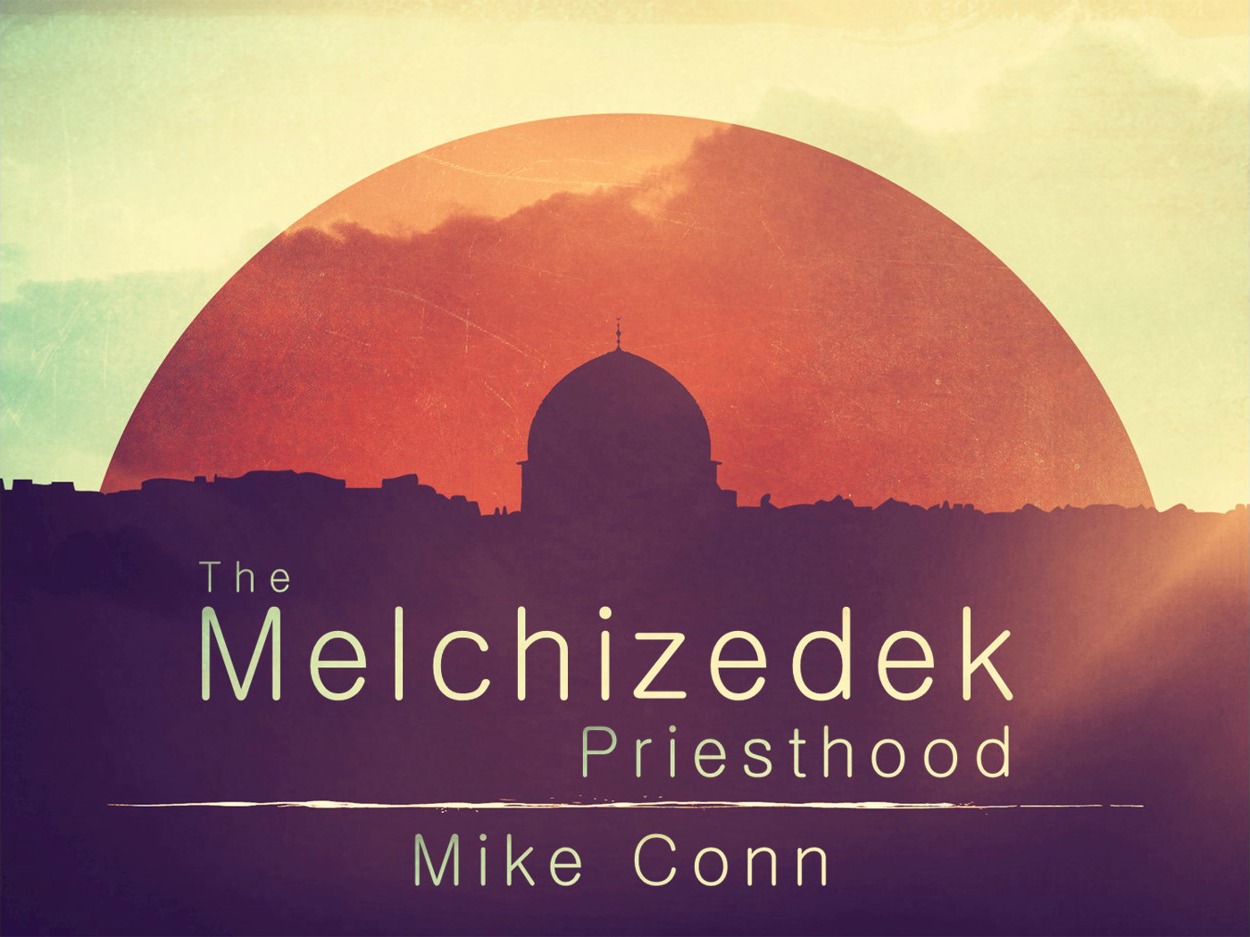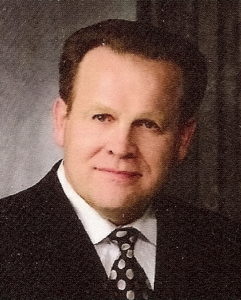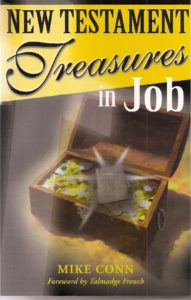By Mike Conn
In Genesis 14 a victorious Abraham returned from a battle in which he defeated four kings who had invaded Canaan. He was met by Melchizedek, the King of Salem and “priest of the most high God” (Genesis 14:18). Melchizedek blessed Abraham and provided his army with food and drink and Abraham gave him one-tenth of all the spoils of war.
About a thousand years later David gave this story more significance. He said the Melchizedek priesthood would someday be revived.
“The Lord hath sworn, and will not repent, Thou art a priest for ever after the order of Melchizedek” (Psalm 110:4).
When Melchizedek, priest of the Most High, met Abraham, there seemed to be a supernatural attraction. It is not impossible that Melchizedek was the Logos, which in the future would inhabit the “man Christ Jesus” and make Him the “Son of God.” If so, this would explain why Abraham was so blessed of the Lord—because he was privileged to have an intercessor. It also explains the necessity of an intercessor for those under the New Covenant, which was patterned after the Abrahamic covenant (Galatians 3; Hebrews 7-8).
Furthermore, if Melchizedek was Abraham’s supernatural intercessor and part of his secret to success, then this was the beginning of intercession and mediation to God on behalf of the human race. It began in the little Jebusite city of Salem, later called Jerusalem. Perhaps this explains the mysterious favor that God has given to Jerusalem.
“Beautiful for situation, the joy of the whole earth, is mount Zion, on the sides of the north, the city of the great King” (Psalm 48:2).
“Out of Zion, the perfection of beauty, God hath shined” (Psalm 50:2).
“In Salem also is his tabernacle, and his dwelling place in Zion” (Psalm 76:2).
Jesus Mediates Between Man And God
The mediation of Christ would be much like an umpire that mediates between teams at a ball game. Job first pointed out the need in Job 9:33 and Paul pinpointed its fulfillment in I Timothy 2:5. Jesus’ prayer in the Garden of Gethsemane and other instances in the Gospels fully portrayed the fact that Jesus functioned as mediator between God the Father and the disciples. Then after His resurrection and ascension, and according to the Book of Hebrews, He entered the highest place of honor in the heavenly Temple to continually make intercession for His church. The writer of the Book of Hebrews said that Jesus’ mediatorial ministry was the “main point” of the book.
“Here is the main point: Our High Priest sat down in the place of highest honor in heaven, at God’s right hand. There he ministers in the sacred tent, the true place of worship that was built by the Lord and not by human hands” (Hebrews 8:1-2, New Living Translation).
Anchor Of The Soul
“We have this hope as an anchor for the soul, firm and secure. It enters the inner sanctuary behind the curtain, where Jesus, who went before us, has entered on our behalf. He has become a high priest forever, in the order of Melchizedek” (Hebrews 6:19-20 New International Version).
The “Melchizedek Priesthood” of Jesus is a literal event because it was an “oath” that was connected to the literal “promise” that God gave to Abraham. God gave both a “promise” and an “oath” and they are “immutable.” It also states that because “it was impossible
For God to lie, we might have a strong consolation, who have fled for refuge to lay hold upon the hope set before us” (Hebrews 6:18).
Some believe that Christ’s ongoing mediation for I I is church is metaphorical imagery. They contend it is not literally taking place for us as it did for the disciples, but evidence suggests otherwise. It is promised along with literal things, such as the promise of blessing to Abraham. It does not make sense that one would be literal and the other metaphorical. The Melchizedek priesthood was considered by the writer of Hebrews as literal as the promise of blessing to Abraham.
Standing On The Right Hand Of God
“But he, being full of the Holy Ghost, looked up stedfastly into heaven, and saw the glory of God, and Jesus standing on the right hand of God, And said, Behold, I see the heavens opened, and the Son of man standing on the right hand of God” (Acts 7:5556).
When Abraham interceded with God for Sodom and Gomorrah the scripture says that he “stood” before the Lord (Genesis 18:22). Later the Bible makes special mention of the “place” where Abraham “stood before the Lord” (Genesis 19:27). Furthermore, it was written that the Lord sought for a man to “stand in the gap” that He would not destroy the land (Ezekiel 22:30). These accounts seem to have influenced Jewish law for it has been said that when someone was tried before the Jewish court, defenders were allowed to stand. Everyone else remained seated. When Gamaliel spoke in defense of Peter and John he “stood up” to address the “council” of the Sanhedrin Court (Acts 5:34). Even today in a court of law, defense attorneys are allowed to stand when presenting their case.
Stephen was being tried before the Jewish “council” on charges of breaking the law of Moses. From all appearances Stephen had no one other than himself to speak in his defense. The Jewish people were the most civilized people in the world, but their actions on this occasion spoke otherwise. The account says they engaged in some very bizarre behavior: “When they heard these things, they were cut to the heart, and they gnashed on him with their teeth” (Acts 7:54). Stephen looked up and had a vision which he related to his accusers. However, when Stephen described his vision to them they rendered themselves dumb and cast aside all justice. Is it possible that the reason the members of the council “stopped their ears and ran upon him with one accord” (Acts 7:57) was that they did not want to hear anything about a heavenly defender who had stood up in his defense?
This is the only reference in the Bible where Jesus is described as “standing” on the right hand of God. In other places He is sitting (Mark 16:19; Colossians 3:1; Hebrews 10:12) or simply “on” the right hand of God (Acts 2:33; Romans 8:34; I Peter 3:22). Paul indicated that His right hand position was for the purpose of intercession (Romans 8:34). Perhaps the vision that Stephen saw was relevant to the unique situation that was taking place on earth.
The Scripture says that Stephen’s prayer for them was similar to Jesus’ prayer on the Cross (Luke 23:34). He “cried with a loud voice, Lord, lay not this sin to their charge” (Acts 7:60). Is it possible the reason Stephen’s words were very similar to the words of Jesus was because he saw Jesus “standing” between an angry God and a sinful people? Is it possible that Stephen caught a glimpse of the heavenly mediatorship of the “man Christ Jesus”?
It must also be added that there was a “young man” named Saul who beheld this strange trial and its result, who would later become a great follower of Christ. One of his converts, Luke, would in turn be inspired to write two books that would be included in the canon of scripture. Paul would be a source for Luke to get the details of Stephen’s trial. It is likely this vision would be the beginning of a major doctrine of the New Testament. If Paul was the author of Hebrews, then there is only one verse outside the writings of Paul that speak of the mediatorship of Christ in the New Testament, and that is I John 2:1.
Therefore it is not impossible that the observation of a “standing” Christ, which Paul heard Stephen describe, was the beginning of a doctrine that brings comfort to all who suffer injustice and experience hardship in life. And Stephen demonstrated that every New Testament believer can be “anchored” in his faith, for the account clearly showed that he had a connection behind the “veil.”
“Which hope we have as an anchor of the soul, both sure and stedfast, and which entereth into that within the veil; Whither the forerunner is for us entered, even Jesus, made an high priest for ever after the order of Melchisedec” (Hebrews 6:19-20).
The Power Of An Endless Life
“And it is yet far more evident: for that after the similitude of Melchisedec there ariseth another priest, Who is made, not after the law of a carnal commandment, but after the power of an endless life. For he testifieth, Thou art a priest for ever after the order of Melchisedec” (Hebrews 7:15-17).
The Melchizedek priesthood of Jesus is positively connected with a priesthood that regularly interceded for people. They were people who were in the process of being “saved to the uttermost” under a priesthood that was not interrupted by death, as Aaron’s was (Hebrews 7:25).
When Jesus spoke about the Father and the Son in the Gospels we understand Him to be referring to flesh (humanity) and Spirit (Father), not to separate gods or persons in the Godhead. In that context we use the argument of the distinction between flesh (God manifested) and Spirit (transcendent God) to preserve the understanding of the Oneness of God in the Gospels. Yet that same argument wonderfully preserves the understanding of the Oneness in this heavenly dynamic as well. I am Oneness through and through, but the only Oneness that I feel comfortable with is the Oneness that Peter and Paul comprehended. Is it possible that our arguing with trinitarians has caused some of them to back off into trithism, and some of us have fallen into the ditch of Jesus Only? Is it possible that we have overlooked something that would help “anchor” those who have “fled for refuge” with a “strong consolation” and a grim’ hope during the difficulties of life.
Furthermore, Hebrews declares the “man Chris! Jesus” to be the heavenly High Priest who is mediator of the New Covenant (Hebrews 8:6; 9:15; 12:24) and is sealed on the “throne of Grace” (Hebrews 4:16) in the heavenly Temple. He is in this office, between a holy God and a sinful people, in order that we might be saved. Only through the Incarnation (Divinity joined with humanity) is He qualified to fulfill that position. Jesus’ humanity and His experience on earth enables Him to qualify as a priest.
“For we have not an high priest which cannot be touched with the feeling of our infirmities; but was in all points tempted like as we are, yet without sin” (Hebrews 4:15).
Unfortunately, some believe the glorified fleshly body of Jesus no longer exists or is metaphorical and not real. This is a position no one can defend, for it actually challenges the validity of the Resurrection. It is a positive I biblical fact that Jesus bodily rose from the dead and is the headquarters of God. Otherwise the Melchizedek priesthood is nothing but metaphorical imagery, though not quite a “lie.” Hopefully no one would suggest that the entire Book of Hebrews is metaphorical imagery. If so, then what would keep someone from suggesting that the Day of Pentecost was metaphorical imagery, as well as the crucifixion, the blood, or the resurrection?
The amazing fact is that this priesthood was not limited to Jesus’ time on earth with the Apostles. It was promised with an “oath” made by God to continue forever or until the end of the age.
“(For those priests were made without an oath; but this with an oath by him that said unto him, The Lord sware and will not repent, Thou art a priest for ever after the order of Melchisedec:)” (Hebrews 7:21; also 5:6; 6:20; 7:17).
If flesh can pray to the Spirit in the Gospels without making a plurality of god’s, then glorified flesh can pray to the Spirit in heaven as well. “O thou that hearest prayer, unto thee shall all flesh come” (Psalm 65:2).
Does Jesus Still Pray To The Father?
“And I will pray the Father, and he shall give you another Comforter, that he may abide with you for ever” (John 14:16).
After His resurrection He still referred to “His” God as the same “God” that His brethren (the disciples) believed in (John 20:17). It cannot be proven that He assumed more divinity after His resurrection than before. It seems evident that whatever He could have done before His resurrection remained possible afterward.
The only reason we struggle with seeing Jesus praying to the Father in heaven as well as on earth is because we fail to distinguish between the glorified “man Christ Jesus” and how He interacts with the Spirit. Our inability to acknowledge this great truth prevents us from pressing a great theological point to those who believe in an Eternal Son, who believe that God the Son makes intercession in our behalf. Paul said that the resurrected “man Christ Jesus” is the One who mediates and intercedes to the Father “for us” (I Timothy 2:5; Romans 8:34). If this simple truth can be understood by those who believe in the trinity, the marvelous Oneness of God could be more easily seen.
City Of Refuge
“That by two immutable things, in which it was impossible for God to lie, we might have a strong consolation, who have fled for refuge to lay hold upon the hope set before us” (Hebrews 6:18).
Those who have obeyed the gospel and have entered the kingdom of God are similar to those who fled to one of the six cities of refuge in Israel under the law. These cities were assigned to the tribe of Levi under the law of Moses (Joshua 21:32-38).
When a person was responsible for the death of another person, including accidental death, self-defense, manslaughter, etc., the murderer had the option of fleeing to one of the six cities of refuge lest a relative of the dead man would kill him in revenge. That person would be under the protection of the elders of the city. He would have a legitimate place in the community and would be safe from all threat of harm. However, that person’s safety was connected with the life of the high priest. After the death of the high priest he was no longer afforded such protection or refuge in the city. It appears that his protection was terminated.
“And the congregation shall deliver the slayer out of the hand of the revenger of blood, and the congregation shall restore him to the city of his refuge, whither he was fled: and he shall abide in it unto the death of the high priest, which was anointed with the holy oil. But if the slayer shall at any time come without the border of the city of his refuge, whither he was fled; And the revenger of blood find him without the borders of the city of his refuge, and the revenger of blood kill the slayer; he shall not be guilty of blood: Because he should have remained in the city of his refuge until the death of the high priest: but after the death of the high priest the slayer shall return into the land of his possession” (Numbers 35:25-28).
The Book of Hebrews was written to a Jewish audience who knew full well what it meant to flee for safety to a city of refuge. In like manner each New Testament believer has taken refuge in a “city” that is mentioned several times in the Book of Hebrews.
“God is not ashamed to be called their God: for he hath prepared for them a city” (Hebrews 11:16;
“For he looked for a city which hath foundations, whose builder and maker is God” (Hebrews 11:10).
“But ye are come unto mount Sion, and unto the city of the living God, the heavenly Jerusalem, and to an innumerable company of angels” (Hebrews 12:22).
Fortunately, in this “city” and under the Melchizedek priesthood, protection never ends, for our High Priest never dies—He “ever liveth to make intercession” (Hebrews 7:25). This is a “strong consolation” that acts as an “anchor” that holds the “soul” of the believer steady through times of difficulty and struggle.
Jesus Is Our Mediator
Paul’s statement about Jesus being the “one mediator” between God and men (I Timothy 2:5) seems to describe a Jesus that mediates for His entire church (both former and latter) in an ongoing process. The tense of the verb “is” in the following scriptures seems to be the real question of this discussion (I Timothy 2:5; Hebrews 8:6; Hebrews 9:15).
If the mediatorial ministry of Jesus would have been limited to His time on earth, would these verses not contain “was” instead of “is”?
Mediation will continue “till he hath put all enemies under his feet” (I Corinthians 15:25). This seems to designate “for ever” (or until the end of the age) and is synonymous with how long God swore the Melchizedek priesthood would last.
The above article, “The Melchizedek Priesthood,” is written by Mike Conn. The article was excerpted from chapter 8 of Conn’s book, New Testament Treasures in Job.
The material is most likely copyrighted and should not be reprinted under any other name or author. However, this material may be freely used for personal study or research purposes.





1 thought on “The Melchizedek Priesthood (Entire Article)”
Comments are closed.